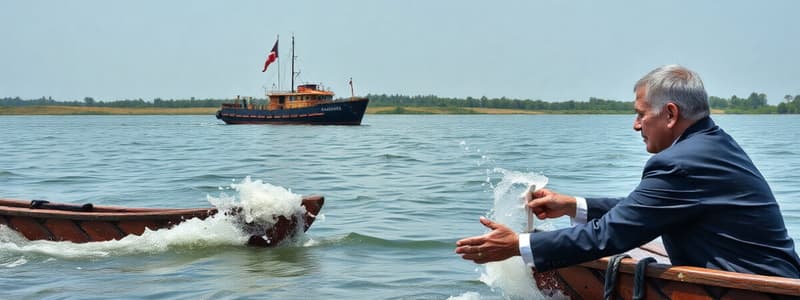Podcast
Questions and Answers
What is indicated by the concept of 'ripeness' in negotiation contexts?
What is indicated by the concept of 'ripeness' in negotiation contexts?
- The necessity of maintaining a united front among states.
- The readiness of participants to begin discussions about reframing problems. (correct)
- The unavoidable nature of conflicts in diplomacy.
- The inherent stability of existing power structures.
Which theory suggests that states may change their interest perception in negotiations?
Which theory suggests that states may change their interest perception in negotiations?
- Realism
- Institutionalism
- Constructivism (correct)
- Critical Theory
What does the phrase 'multiple personalities' in the context of states imply?
What does the phrase 'multiple personalities' in the context of states imply?
- States may showcase different diplomatic behaviors depending on the context. (correct)
- States always work together cohesively in diplomatic efforts.
- States exhibit consistent behavior in all negotiations.
- States have fixed identities that remain unchanged during negotiations.
What primary type of power is associated with corrective style in negotiations?
What primary type of power is associated with corrective style in negotiations?
How does external shocks influence negotiation styles according to the content?
How does external shocks influence negotiation styles according to the content?
What largely influences the behavior of non-state and multilateral actors in diplomatic contexts?
What largely influences the behavior of non-state and multilateral actors in diplomatic contexts?
What is a characteristic of network diplomacy according to the content?
What is a characteristic of network diplomacy according to the content?
Since the Peace of Westphalia, what role has diplomacy primarily served?
Since the Peace of Westphalia, what role has diplomacy primarily served?
What does new diplomacy promise in terms of its approach to communication?
What does new diplomacy promise in terms of its approach to communication?
What is suggested regarding the study of hydrodiplomacy?
What is suggested regarding the study of hydrodiplomacy?
Flashcards
Corrective Style
Corrective Style
A negotiation strategy that uses force or threats to achieve desired outcomes.
Coercion
Coercion
The ability of one state to influence the actions of another state through the use of force or threats.
Power Sources
Power Sources
The use of power to achieve desired outcomes in negotiations.
Negotiation Styles
Negotiation Styles
Signup and view all the flashcards
Ripeness
Ripeness
Signup and view all the flashcards
New Diplomacy
New Diplomacy
Signup and view all the flashcards
Diplomacy's New Audience
Diplomacy's New Audience
Signup and view all the flashcards
Non-State Actor Diplomacy
Non-State Actor Diplomacy
Signup and view all the flashcards
Network Diplomacy
Network Diplomacy
Signup and view all the flashcards
Scaling Hydrodiplomacy
Scaling Hydrodiplomacy
Signup and view all the flashcards
Study Notes
Powering Hydrodiplomacy
- The article argues that power is crucial in understanding hydrodiplomacy.
- Current literature on hydrodiplomacy focuses too much on diplomacy itself and not enough on the use of power.
- Effective rule and negotiation need both hard power (coercion) and soft power (persuasion).
- Varying negotiation styles exist, differing in their use of power resources.
- Analyzing negotiations through the lens of Realism, Institutionalism, Constructivism, and Critical theory provides a more comprehensive view.
- A typology of power resources ("power animals") and the time factor (uncertainty, past traumas, future uncertainties, path dependency) are important considerations in hydrodiplomacy.
- A transboundary example (Scheldt River dispute) and a local example (Yemeni irrigation system) illustrate the importance of considering power and time in hydrodiplomacy.
- Institutions alone aren't sufficient to resolve hydrodiplomatic conflicts; other power sources need to be explored.
Classical vs. Network Diplomacy
- Classical state diplomacy and network-based hydrodiplomacy coexist.
- Numerous non-state actors now participate in diplomacy.
- Non-state actors may mimic state actors in diplomacy but bring unique dynamics.
- Water conflicts are complex due to their visibility and symbolic nature.
- The potential for water wars, though less likely, is a concern.
- Large infrastructural projects often raise conflicts.
- Hydrodiplomacy requires a broad approach to understand the varying power dynamics and how actors frame water conflicts.
Problems with Hydrodiplomacy Discourse
- Current literature on hydrodiplomacy often overlooks the significant role of hard power.
- Current definitions of hydrodiplomacy tend to assume actors are benevolent and committed to peace.
- This omission prevents a full understanding of conflicts and diplomatic interactions.
- Different power resources can be employed in different negotiation styles.
- Realist, institutionalist, constructivist, and critical theories offer unique perspectives on power and negotiation styles.
Power Resources and Styles
- Power resources are critical in diplomacy and bargaining.
- Actors' choice of negotiation styles depends on various factors.
- These factors include organizational culture, available power resources, position within a hierarchy, and "back-table" considerations.
- The "power animals" (lion, fox, bear, owl) are different types of power described by John Scott.
- The time element, including the "shadow of the future" and "shadow of the past", also influences negotiation.
Case Studies
- The Scheldt River dispute illustrates the use of different power styles over time as institutions take centre stage and actors engage in power struggles.
- The case from Yemen highlights how different power resources (especially those involving institutions) are employed in local hydro-political interactions.
Conclusion
- Exploring multiple power dimensions and styles is essential in expanding hydrodiplomacy analysis.
- The framework presented offers a more comprehensive approach to understanding diplomacy in water-related conflicts, considering various actors and their motivations.
Studying That Suits You
Use AI to generate personalized quizzes and flashcards to suit your learning preferences.


